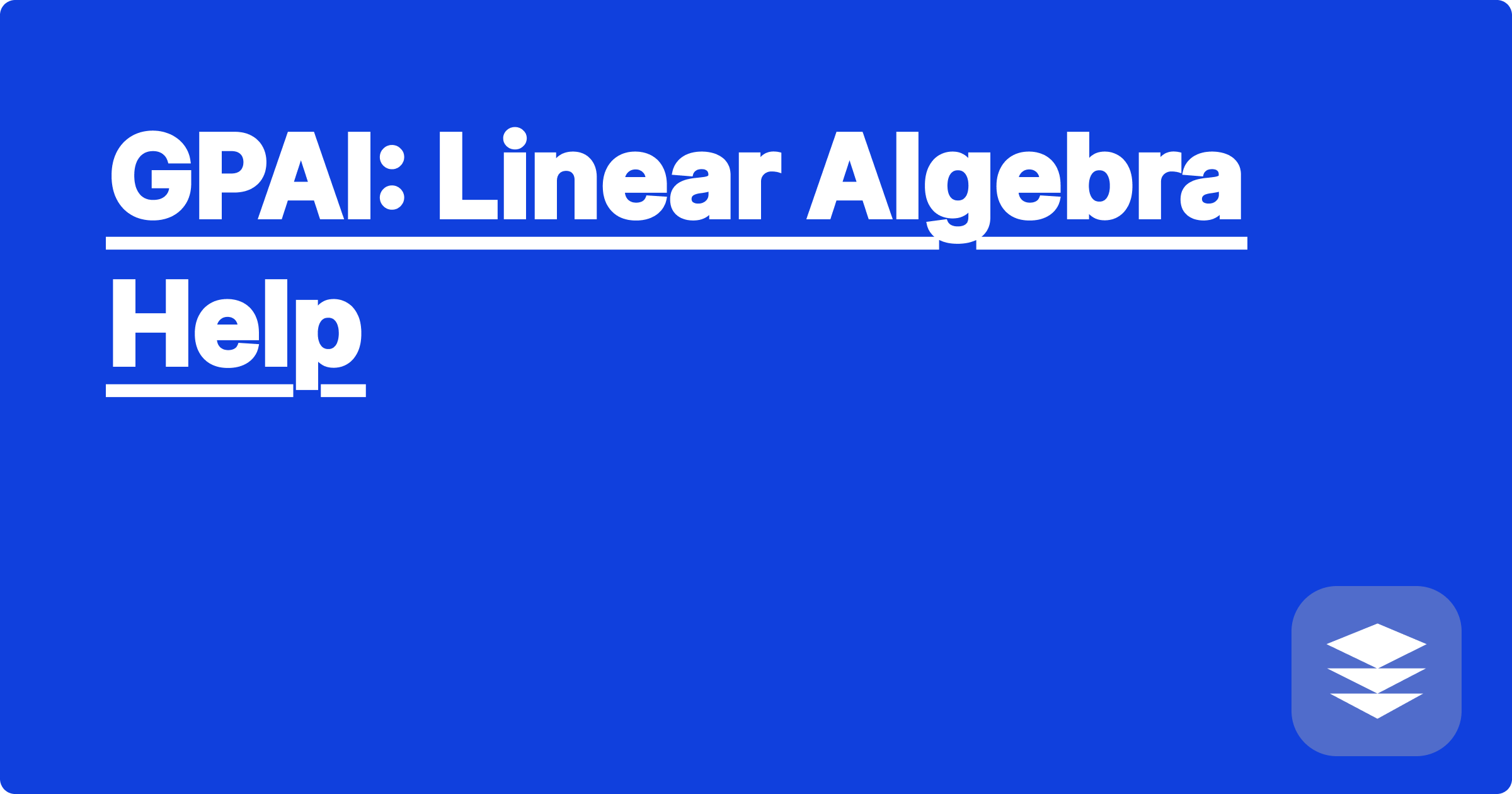
STEM fields often present complex challenges, and linear algebra, with its abstract concepts and intricate calculations, can be a significant hurdle for many students and researchers. Fortunately, the rise of Generative Pre-trained Transformer (GPT) powered AI tools offers new avenues for understanding and tackling these challenges. These AI assistants can provide step-by-step solutions, explain complex concepts in simpler terms, and even generate practice problems, effectively acting as personalized tutors.
For STEM students and researchers, mastering linear algebra is often crucial for success. It forms the foundation of many disciplines, from computer science and engineering to physics and economics. A strong grasp of linear algebra enables one to model and solve complex systems of equations, analyze data, and develop algorithms. Leveraging AI tools can significantly enhance learning and research productivity by providing on-demand support and accelerating the problem-solving process. This can free up valuable time and cognitive resources, allowing students and researchers to focus on deeper understanding and more advanced applications.
Linear algebra deals with vector spaces, matrices, and linear transformations. These concepts are essential for representing and manipulating data in various scientific and engineering applications. A common challenge students face is understanding the abstract nature of these concepts and applying them to solve practical problems. For example, performing operations like matrix multiplication, finding eigenvalues and eigenvectors, or solving systems of linear equations can be computationally intensive and conceptually challenging. Furthermore, understanding the geometric interpretations of these operations can be difficult, hindering a deeper understanding of the subject. The sheer volume of formulas and theorems can also be overwhelming, making it difficult to connect the dots and see the bigger picture.
AI tools like ChatGPT, Claude, and Wolfram Alpha offer powerful capabilities for assisting with linear algebra problems. These tools can be used to break down complex problems into smaller, manageable steps, provide explanations for each step, and even generate visualizations to aid understanding. They can also act as intelligent calculators, performing complex matrix operations and solving systems of equations quickly and accurately. By leveraging these tools, students and researchers can overcome computational hurdles and focus on the underlying concepts and applications. These AI assistants can also be used to generate practice problems and offer personalized feedback, further enhancing the learning process.
To use an AI tool for a linear algebra problem, begin by clearly defining the problem. This might involve stating the given information, such as matrices or vectors, and specifying the desired outcome, like solving a system of equations or finding eigenvalues. Next, input the problem into the AI tool using appropriate syntax. For example, you might represent matrices using brackets and commas, separating rows with semicolons. After inputting the problem, request the specific operation you want the AI to perform, such as "find the determinant" or "solve the system of equations." The AI will then process the input and provide the solution, often accompanied by step-by-step explanations. Carefully review the output, paying attention to the logic and reasoning behind each step. If the output is unclear, rephrase the input or ask for further clarification.
Consider the problem of finding the eigenvalues and eigenvectors of a matrix A = [[2, 1], [1, 2]]. Input this matrix into Wolfram Alpha or a similar tool using the appropriate syntax, for example, {{2,1},{1,2}}. Then, request the eigenvalues and eigenvectors. The AI will return the eigenvalues, which are λ₁ = 3 and λ₂ = 1, and their corresponding eigenvectors, v₁ = [1, 1] and v₂ = [-1, 1]. Another example is solving a system of linear equations, such as 2x + y = 5 and x - y = 1. Input these equations into ChatGPT or Claude, and the AI will provide the solution x = 2 and y = 1. These examples demonstrate the practical utility of AI tools for handling common linear algebra problems. They can also be used to visualize vector spaces, understand linear transformations, and explore more advanced concepts like singular value decomposition.
To effectively use AI in STEM education and research, it's crucial to develop a strong foundational understanding of the underlying concepts. AI tools should be used as supplements to learning, not replacements for traditional study methods. Actively engage with the AI's output, questioning its reasoning and seeking further clarification when needed. Don't simply accept the answers at face value. Instead, use the AI as a guide to understand the problem-solving process and develop your own intuition. Experiment with different AI tools and explore their various functionalities. Some tools might be better suited for specific types of problems or offer more detailed explanations. Finally, remember the importance of ethical considerations. Avoid using AI tools to bypass learning or plagiarize work. Instead, use them responsibly to enhance your understanding and accelerate your research.
To further enhance your learning experience, explore the vast resources available online, including textbooks, online courses, and interactive tutorials. Practice regularly with different types of problems and seek feedback from professors and peers. By combining traditional learning methods with the power of AI, you can significantly improve your understanding of linear algebra and achieve academic success in STEM fields. Embrace the potential of AI as a powerful tool for learning and discovery, and continue to explore its evolving capabilities.